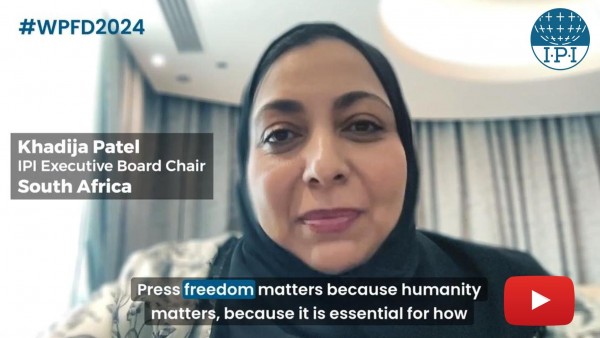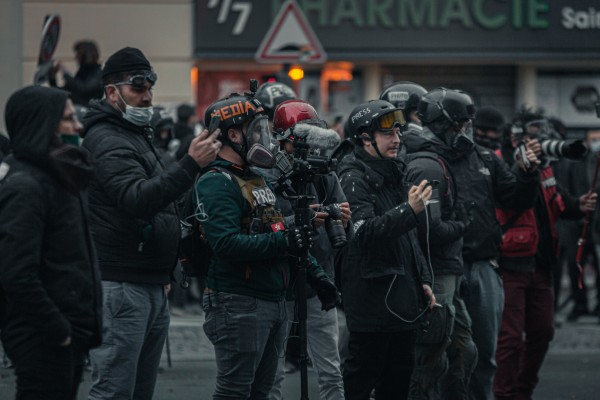The first session of the International Press Institute (IPI)’s 2016 World Congress in Doha, “Covering the Arab World: Documenting Change”, explored the dangers that journalists currently face while reporting in conflict zones and amid an overall lack of press freedom in the Arab region.
Keynote speaker Tawakkol Karman, a journalist and a Nobel Prize laureate from Yemen, stressed the importance of freedom of speech in the Arab world and pointed out the consequences that come with media repression.
“Now, the freedom of expression does not exist,” she said. “People are slaughtered on the streets for their continued struggle for freedom of expression.”
Karman added that in many countries across the region, those who seek access to information risk ending up in prison, torture or worse.
Yara Badr, from the Syria Center for Media and Freedom of Expression (SCM), joined the panel in behalf of her husband, Mazen Darwish, a Syrian attorney and free speech advocate, who in 2015 was released from prison after years behind bars. Darwish was unable to attend the conference, as Turkish authorities detained him late yesterday while he attempted to transit through Istanbul’s Ataturk airport and refused to allow him to proceed to Qatar.
Nevertheless, Darwish joined the proceedings briefly via Skype from Geneva and he thanked IPI and Al Jazeera for their efforts and advocacy on his behalf during the years he was imprisoned in Syria.
Badr, who runs the SCM with her husband, said that it is difficult to figure out who is a journalist in Syria because there are so many media activists, many of whom do not share the same level of professionalism as journalists. Most of these activists are people who have been personally affected by the situation in Syria, she noted, and they often struggle to remain objective. She also noted that way in which authorities in Syria, and in many other Arab countries, use the law against journalists.
Rana Sabbagh, executive director of Arab Reporters for Investigative Journalism (ARIJ) in Jordan, noted similar challenges in her country.
“Any journalist can become a traitor,” she said. “What has happened is that a lot of forces merged together and basically got the upper hand in the battle against independent media.”
Many Jordanian journalists struggle with self-censorship and a lack of public support, Sabbagh commented. She said that the Jordanian public did not want to hear negative news and that people were fed up with news of death, destruction and chaos.
Sabbagh similarly highlighted the existing laws which can be used to hinder journalists and she noted that several of her colleagues had been brought to court.
“The whole dream of access to information has disappeared,” she lamented However, Sabbagh acknowledged that not everything happening in the Arab world was negative, indicating that Tunisia’s new Constitution gave her some hope with regard to press freedom.
“Nobody can tell a journalist not to write something,” she said.
Although privately owned media can still be rife with corruption and conflict of interests, Sabbagh said, that should not deter journalists because “it is our job to be the watchdogs for society”.
That type of advocacy plays an important role for both the public and imprisoned journalists. Abdullah al-Shami, an Al Jazeera journalist who was previously jailed in Egypt, briefly joined the panel to voice his belief that campaigns that put pressure on governments to allow journalists to practice freely make a difference. Speaking from experience, al-Shami said such a campaign on his behalf gave him encouragement when he was in prison.
Taking the liberty to speak on behalf the 90 other Egyptian journalists who he said are still behind bars in his country, al-Shami urged those present at the conference to press for their release.



